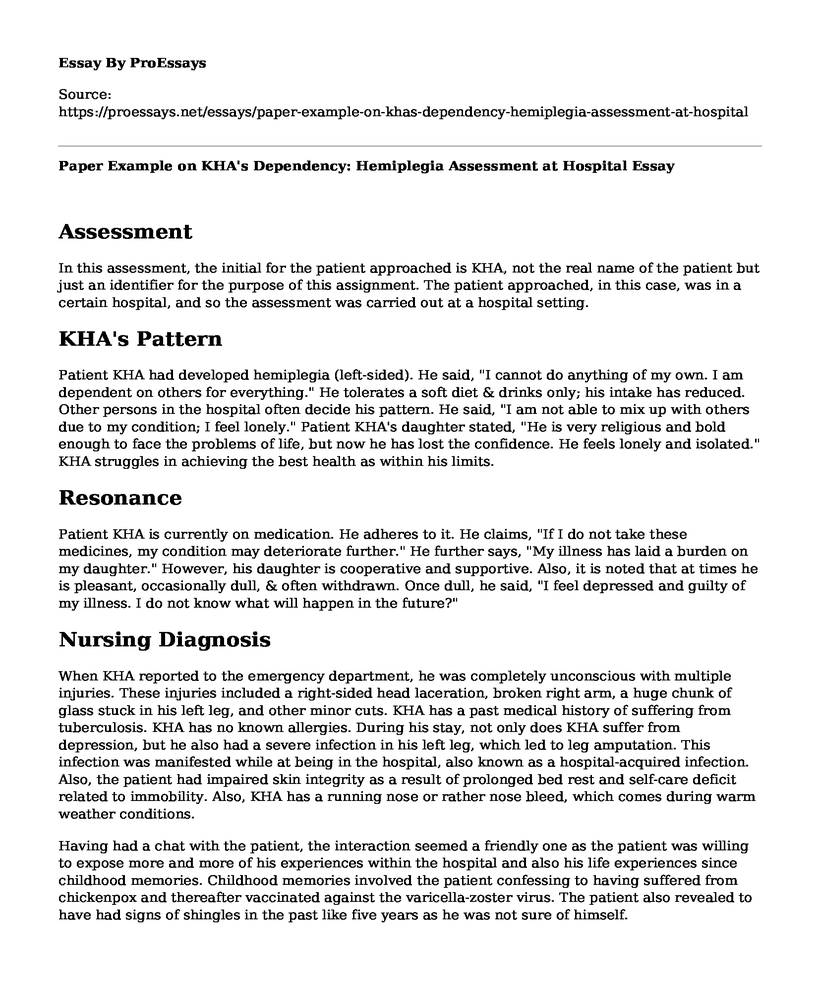Assessment
In this assessment, the initial for the patient approached is KHA, not the real name of the patient but just an identifier for the purpose of this assignment. The patient approached, in this case, was in a certain hospital, and so the assessment was carried out at a hospital setting.
KHA's Pattern
Patient KHA had developed hemiplegia (left-sided). He said, "I cannot do anything of my own. I am dependent on others for everything." He tolerates a soft diet & drinks only; his intake has reduced. Other persons in the hospital often decide his pattern. He said, "I am not able to mix up with others due to my condition; I feel lonely." Patient KHA's daughter stated, "He is very religious and bold enough to face the problems of life, but now he has lost the confidence. He feels lonely and isolated." KHA struggles in achieving the best health as within his limits.
Resonance
Patient KHA is currently on medication. He adheres to it. He claims, "If I do not take these medicines, my condition may deteriorate further." He further says, "My illness has laid a burden on my daughter." However, his daughter is cooperative and supportive. Also, it is noted that at times he is pleasant, occasionally dull, & often withdrawn. Once dull, he said, "I feel depressed and guilty of my illness. I do not know what will happen in the future?"
Nursing Diagnosis
When KHA reported to the emergency department, he was completely unconscious with multiple injuries. These injuries included a right-sided head laceration, broken right arm, a huge chunk of glass stuck in his left leg, and other minor cuts. KHA has a past medical history of suffering from tuberculosis. KHA has no known allergies. During his stay, not only does KHA suffer from depression, but he also had a severe infection in his left leg, which led to leg amputation. This infection was manifested while at being in the hospital, also known as a hospital-acquired infection. Also, the patient had impaired skin integrity as a result of prolonged bed rest and self-care deficit related to immobility. Also, KHA has a running nose or rather nose bleed, which comes during warm weather conditions.
Having had a chat with the patient, the interaction seemed a friendly one as the patient was willing to expose more and more of his experiences within the hospital and also his life experiences since childhood memories. Childhood memories involved the patient confessing to having suffered from chickenpox and thereafter vaccinated against the varicella-zoster virus. The patient also revealed to have had signs of shingles in the past like five years as he was not sure of himself.
The good thing having interviewed patient KHA is that he was very cooperative, friendly, a social character, and willing to interact with any form of questions I did try to raise. The patient gave me an excellent audience by lengthily paying attention to when I tried to explain myself. Also, when I tried to intervene and ask for clarities, the patient did cooperate.
However, like any other person or humankind, no one is perfect, and no interview involving the same people can ever be a perfect one as I faced a few challenges during the interview with KHA. One major challenge was that the patient was not fully prepared for the interview and that it was only carried out in a rush as to avoid interfering with his caregivers and the medical staff. Another challenge was that since the patient was undergoing medication, he might have developed fatigue during the course of the interview as he started losing concentration towards the end. In dealing with such barriers, especially for the fatigue and so concentration, I had to engage the patient in instant moments of humor, make jokes about crazy things that otherwise drew his attention. Going forward, such barriers can be overcome through thorough preparations before the interview, consultations with the interviewee be carried out too so that when the interview occurs, everyone will be well set to go. Moreover, these were also the anticipated challenges as I knew it was not a well-prepared interview, and such things do happen with a lack of initial research, consultations, and preparedness.
Conclusion
Besides, I wished I had asked the patient more about his mental-health status, how he perceives life, and how he feels about other people in the entity. Such information would have been crucial to getting to know how life has transformed people, with the current changes in technology and climate. Also, I wish I had asked the client or rather patient how he feels about the current ongoing pandemic of COVID19, what he really thinks is the best way going forward, if scared of it, and what he thinks are the outcomes or results that should be anticipated.
Cite this page
Paper Example on KHA's Dependency: Hemiplegia Assessment at Hospital. (2023, Jul 21). Retrieved from https://proessays.net/essays/paper-example-on-khas-dependency-hemiplegia-assessment-at-hospital
If you are the original author of this essay and no longer wish to have it published on the ProEssays website, please click below to request its removal:
- Impact of the Artful Moments Intervention on Persons With Dementia and Their Care Partners
- Distress and Depression in Diabetic Persons and Their Relationship With Self-Care Practitioners in Barbados
- Essay Example on HL7: A Standard for Healthcare Information Management
- Ensuring Quality Maternal Healthcare for Women in the US: A Systematic Issue - Essay Sample
- Research Paper on Foster Care Services: A Viable Intervention for Neglected Children
- Paper Example on Airline Flight 1420: NTSB Report, Causes & Recommendations
- Case Study Sample on Ethical Role of Nurses







